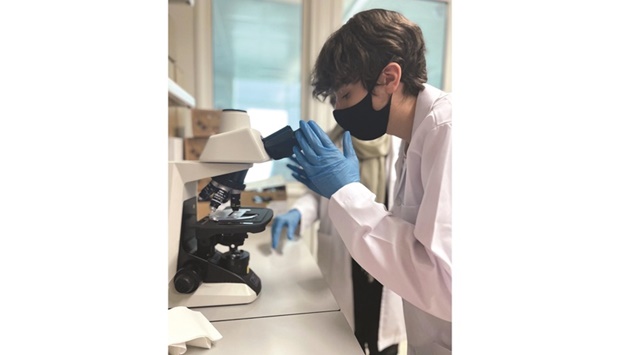Qatar Biomedical Research Institute (QBRI), part of Hamad Bin Khalifa University (HBKU), recently conducted its first School Internship Programme for grade 12 and 13 students from Doha British School (DBS) and the American School of Doha (ASD). The programme enabled aspiring scientists to learn more about the innovative work QBRI does and offered hands-on research experience.
The programme was part of the institute’s capacity-building initiatives to attract the next generation to the research field. Seven students joined the programme for two weeks and were able to gain valuable insights into topics such as stem cells, diabetes, and neurological disorders.
The initiative was supervised by researchers from two QBRI research centers - the Neurological Disorder Research Center and the Diabetes Research Center. Students were taught about stem cells, pancreatic β cell differentiation, biochemical assays, protein expression, protein purification, anatomy of the brain, cell culture, molecular genetics, and neuroinflammatory. In addition to hands-on research experiences at QBRI’s advanced laboratories, Dr. Nishant Vaikath, research associate, gave the students a session titled “Tools for Efficient Scientific Literature Search - Basics”.
Lina Hassna, programmes and partnerships senior manager at QBRI, said: “This programme is one of our key capacity-building initiatives for youth in Qatar. We aim to help students attain hands-on experience while working closely with a group of experienced scientists”.
Mariam al-Haggan, a student at DBS, said: “This was a valuable and amazing learning experience for me. I was mentored by two scientists from QBRI, who explained the equipment we worked with, and provided hands-on training while learning about stem cell differentiation and working with proteins.”
Home to three research centers – the Translational Cancer and Immunity Center, the Diabetes Research Center, and the Neurological Disorders Research Center – QBRI aligns with the Qatar National Research Strategy and Qatar National vision 2030, aiming to the development of human capital. Through its ongoing outreach initiatives, the institute seeks to promote innovative research among the wider community and nurture a passion for seeking out novel solutions to prevalent diseases in Qatar and the region.
The initiative was supervised by researchers from two QBRI research centers - the Neurological Disorder Research Center and the Diabetes Research Center. Students were taught about stem cells, pancreatic β cell differentiation, biochemical assays, protein expression, protein purification, anatomy of the brain, cell culture, molecular genetics, and neuroinflammatory. In addition to hands-on research experiences at QBRI’s advanced laboratories, Dr. Nishant Vaikath, research associate, gave the students a session titled “Tools for Efficient Scientific Literature Search - Basics”.
Lina Hassna, programmes and partnerships senior manager at QBRI, said: “This programme is one of our key capacity-building initiatives for youth in Qatar. We aim to help students attain hands-on experience while working closely with a group of experienced scientists”.
Mariam al-Haggan, a student at DBS, said: “This was a valuable and amazing learning experience for me. I was mentored by two scientists from QBRI, who explained the equipment we worked with, and provided hands-on training while learning about stem cell differentiation and working with proteins.”
Home to three research centers – the Translational Cancer and Immunity Center, the Diabetes Research Center, and the Neurological Disorders Research Center – QBRI aligns with the Qatar National Research Strategy and Qatar National vision 2030, aiming to the development of human capital. Through its ongoing outreach initiatives, the institute seeks to promote innovative research among the wider community and nurture a passion for seeking out novel solutions to prevalent diseases in Qatar and the region.

